Earlier this year, Liam Elkind seized an opportunity to ask his longtime congressman, Jerry Nadler, what everyday New Yorkers like himself could do to help Democrats stand up to Donald Trump. Nadler’s response, according to Elkind, was to “donate to the DCCC” – the group that helps House Democrats keep their seats. Deeply unsatisfied, the 26-year-old decided to run for office against the 17-term incumbent.
In Georgia, Everton Blair also sought answers from his long-serving congressman, David Scott, at a panel event earlier this year. When Blair asked him about Democrats’ legislative strategy, the 80-year-old lawmaker was dismissive. “I don’t know who sent y’all,” he said. Blair, 34, is now making a bid for Scott’s seat.
Jake Rakov began to worry when he noticed his former boss, 70-year-old California congressman Brad Sherman, repeating the same anti-Trump talking points he’d deployed eight years prior. To Rakov, 37, it was a sign that the Democratic party’s ageing establishment “wasn’t going to learn”. He is now one of two millennial-aged Jakes challenging Sherman.
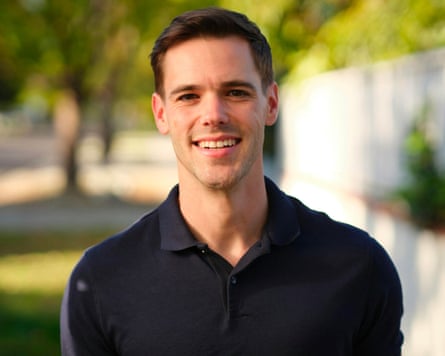
A year after Joe Biden’s age and fitness for office emerged as a major liability in the 2024 presidential election, followed by Trump’s return to power , demand for generational change has reached a fever pitch. A wave of younger, social-media savvy candidates, frustrated by what they see as an ossifying, out-of-touch Democratic establishment, is launching primary challenges against some of their party’s most senior incumbents.
The insurgents charge that party elders have failed to act with urgency as Trump targets Democratic cities, voters and values, and they say they’re no longer willing to wait their turn.
“If what happened last year was not a wake up call for the Democratic party that we need to do things differently and that we need to let some new voices in, then we should all be deeply worried about the future of the Democratic party,” said Luke Bronin, a 46-year-old who is running against Connecticut congressman John Larson, 77.
The 119th Congress is the third oldest in US history, and three members – all Democrats – have died in office this year. More than a dozen House Democrats who will be 70 or older by election day 2026 are facing challengers, according to an analysis by Axios, though not all have said whether they plan to seek re-election.
But the push to replace longtime incumbents isn’t just about age, says Saikat Chakrabarti, 39, a former chief of staff to New York representative Alexandria Ocasio-Cortez who is running for the San Francisco congressional seat long held by the former House speaker Nancy Pelosi.
They say it’s about energy, vision and, crucially, how hard they’re willing to fight – which could explain why octogenarian brawlers like Maxine Waters haven’t faced calls to step aside while some relatively younger members, such as 50-year-old André Carson, have drawn challengers.
“It’s being a part of a system for so long you just don’t actually think it’s your job to renew it,” Chakrabarti said.
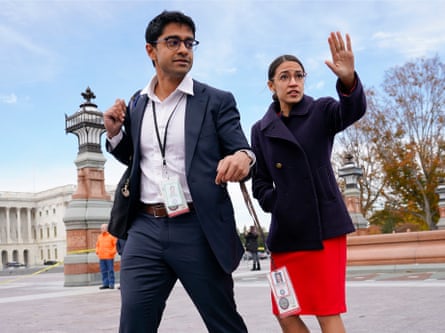
Pelosi, 85, who stepped down from her leadership position to make room for a new generation in 2022, has not yet said whether she plans to seek re-election. A spokesperson for Pelosi declined to comment.
While their campaigns are textured by local issues and cultural references – Elkind touts his go-to bagel order (un-toasted everything with whitefish salad) and Chakrabarti pitches a publicly owned utility for San Francisco – their broader messages chime: Democratic elders have grown complacent, clinging to a broken status quo – with devastating consequences.
Democrats’ popularity has cratered to record lows and the party has bled voters – especially young people, first-timers, and Black and Latino Americans.
But the incumbents are pushing back. They argue their years of experience have delivered tangible results. “These guys would start off with zero seniority, just when the district needs the most help,” Sherman, the California congressman, said in an interview. He dismissed claims he’s been timid on Trump, noting he introduced articles of impeachment against him in 2017 and, earlier this year, confronted the president at an in-person briefing on the Palisades fire that devastated parts of his district.
“The key to fighting Donald Trump is beating him in the 2026 election,” Sherman said. “If we don’t take the House back in 2026 we may not have elections in 2028.”
Many challengers align politically with the incumbents they’re trying to unseat – several have voted for their opponent in the past. They argue the intraparty divide is not left-versus-center but a clash between “the fighters and the folders” – those who see the Trump era as a troubling but passing chapter and those who see it as a constitutional emergency that will determine the survival of American democracy.
The younger candidates say the party needs to “meet voters where they are” – on social media, on podcasts, at red county diners and rambunctious town halls. They want leaders who can speak plainly about the ways the Trump administration is hurting working-class Americans – and how Democrats would help.
But they also say it can’t only be about Trump. The party needs a full-scale reimagining of what Democrats stand for and how they communicate that to voters – a type of messaging they’ve struggled to articulate in the Trump era.
Democrats haven’t always embraced primaries. They can be costly and time-consuming, and create headaches for general election races. But in the midst of deep party introspection and generational friction, more are embracing the contests as a way forward.
Groups such as Leaders We Deserve, led by former Democratic national committee vice-chair David Hogg, are actively backing young candidates challenging “asleep-at-the-wheel” incumbents. The effort sparked an internal firestorm and ultimately led Hogg to step down from his role at the DNC.
Republicans are watching the primary battles unfold with glee. “Democrats are engaged in a battle between the socialists and the party dinosaurs – and it’s only getting uglier,” Mike Marinella, spokesperson for the national Republican congressional committee, said.
Next year’s elections will test Democrats’ desire for generational change but it may not resolve their identity crisis. Some districts will elevate centrist candidates, while others might embrace a democratic socialist. Some crave an anti-establishment streak, ideology aside.
And some veteran lawmakers have already chosen to relinquish power. In May, Democratic congresswoman Jan Schakowsky announced that her 14th term representing Illinois’s ninth district would be her last, saying in a statement: “It is now time for me to pass the baton.” Before she made the decision public, Kat Abughazaleh, a 26-year-old progressive political influencer, had already launched a campaign for the seat, asking Democrats: “What if we didn’t suck?”
Primed for Congress, but not waiting for an opening
Among the contenders in Democratic primaries are local and state political leaders for whom Congress makes sense as a next logical step. In years past, they might have opted to wait for a retirement and then seek an endorsement from the outgoing congressman. Not any more.
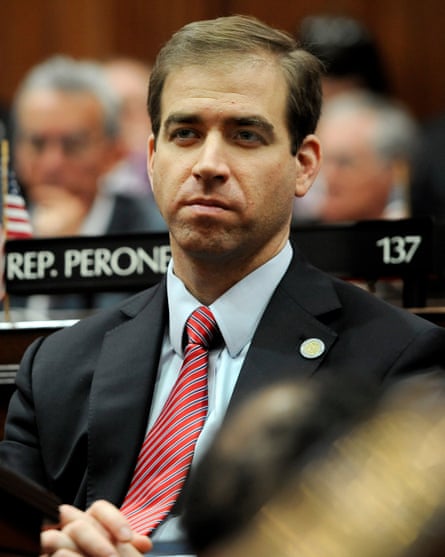
At 46, Luke Bronin has a lengthy résumé of service: a lawyer, former Obama administration official, navy reserve intelligence officer and, most recently, mayor of Hartford, Connecticut. But he stresses that he’d also bring “an outsider’s commitment to making some bigger changes”.
Bronin has spoken with Larson, the longtime incumbent in Connecticut’s first district, including an hourlong conversation in recent months. What was missing, he said, was any recognition that the job has fundamentally changed since Larson arrived in Washington in 1999.
“I didn’t hear a sense of urgency that we need to hear from every single member of Congress,” Bronin said.
Bronin thinks Democrats need to be “relentless and clear” about the ways Trump is making life worse for Americans, and “equally relentless and clear” about the Democratic party’s vision for improving their daily lives. He wants to see “an intense focus on issues like housing and healthcare and childcare”, and for Democrats to spread these messages in friendly and unfriendly forums.
In a statement, the Larson campaign said the district needs a “proven fighter” to protect against Trump’s attacks on social security and Medicare.
“That’s Congressman Larson. That’s why he’s backed by progressive groups, labor, and working people alike,” the campaign said. “What they don’t need is someone pretending to be a new voice who’s actually been in politics [for] decades that’s always been more focused on running for higher office than delivering results.”
Chakrabarti, who has spend much of his political career working to elect progressives to Congress, said he began to seriously consider a run himself after listening to a New York Times podcast interview with Pelosi just days after the November election. He had expected Democrats’ crushing defeat to trigger a reckoning – but instead heard a defense of the status quo.
It confirmed for Chakrabarti what he had long feared: the Democratic party was “sort of sleepwalking into this dystopia”.
But progressives like Chakrabarti take hope from the success of state assemblyman Zohran Mamdani in the New York City Democratic mayoral primary this summer.
“When I look at the moment today, the appetite for change, it completely dwarfs what I saw in 2018,” Chakrabarti said, referring to the election year in which Ocasio-Cortez toppled one of the most senior House Democrats as a political unknown.
“We’re at the point of a dawn of a new political era.”
after newsletter promotion
The crowded primaries
Several candidates have filed to run in Georgia’s 13th district, a solidly blue area in the Atlanta suburbs, a sign of the vulnerabilities among older members and the enthusiasm to replace them. Scott, who has served in Congress since 2003, has not yet announced whether he will run again. Questions over his health and fitness for office have become public fodder – he lambasted a photographer for taking a photo of him in a wheelchair last year.
Some are younger than the average age in Congress (58.9); all are younger than Scott, 80. One contender, state senator Emanuel Jones, is 66. In 2024, Scott fended off a crowded field of primary challengers to keep his seat.
Jasmine Clark, 42, was first elected to the state house in Georgia in 2018. She has a PhD in microbiology, an expertise that has served her well in analyzing bills and communicating during the pandemic. If elected, would be the first woman with a science PhD in Congress.
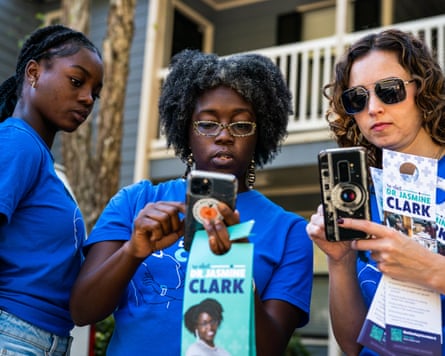
She wants the district to have a fighter who can call out the rampant misinformation and disinformation coming out of the Trump administration. The Atlanta area is feeling the consequences of this information environment, she said, pointing to a shooting earlier this month at the Centers for Disease Control and Prevention by a man alleged to be fixated on the Covid-19 vaccine.
“When you have the same people in the same place for a really long time, that stagnation leads to stagnation of ideas as well,” she said. “There should be a healthy turnover, where you still have institutional knowledge while ushering in new ideas. But for whatever reason, we don’t really see that in Congress.”
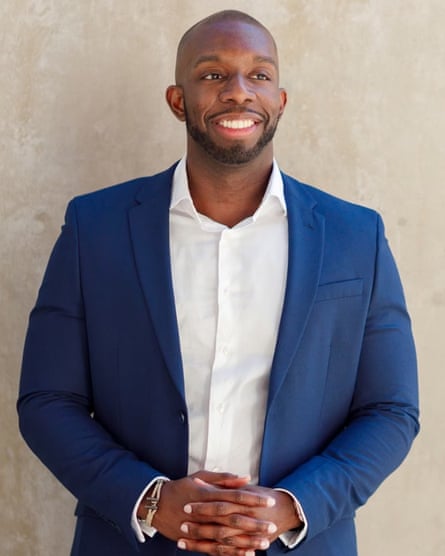
Everton Blair, who served on the Gwinnett county board of education, is touting his deep ties to the district where he was born and raised. He sees a lot of opportunities left on the table because of inactive representation.
“There’s a general sense of despondency and just apathy right now that we address and we combat by bringing those very voices and people back into the conversation and making sure that they feel represented well,” Blair said.
“The leaders who got us into this mess are not the leaders who can get us out of it,” he added.
Scott did not respond to a request for comment.
In California, Jake Rakov, who served as a deputy communications director for Brad Sherman, the 15-term incumbent he’s challenging, is making a similar case. He hasn’t spoken to his old boss in years, but he has been talking to the congressman’s constituents. Many, he said, are shocked that any member – let alone their own – has been in Congress for nearly 30 years.
“We’ve got people in office who’ve been there since the 1990s and are still legislating like it’s the 1990s,” he said, adding: “It is so antithetical to our idea of a representative democracy that it just is immediately offensive to people when they hear about it.”
Sherman has also drawn a challenge from Jake Levine, a veteran of the Biden and Obama administrations whose mother lost her home in the January fires. “It’s time for something new,” Levine says in his campaign launch video.
Sherman argued that calls for generational change aren’t new. Estimating that he’s taken about 5,000 votes in Congress over the past decade, the overwhelming majority of which his challengers would agree with, Sherman asked: “If you did something right 5,000 times in a row – 100% of the time – is there any chance that you should get fired?”
The upstarts
Upstart candidates traditionally face steeper challenges against incumbents, but, with the help of slick online content, they’re finding new ways to gain traction. In an Arizona special election earlier this year, Deja Foxx, a 25-year-old influencer and activist, came in a distant second behind a longtime Democratic official whose father held the seat until his death – but she still managed to win more than 22% of votes.
Katie Bansil, a 34-year-old political newcomer who works in finance, is challenging congressman Frank Pallone, 73, in New Jersey’s sixth congressional district over his support for Israel’s war in Gaza. Since launching her campaign, Bansil, who immigrated to the US from the Philippines and grew up in New Jersey, says she’s seen a growing desire for new leadership.

“I started calling him ‘the asterisk’, because a lot of people have told me, ‘Oh, I just vote for the guy that is labeled as the incumbent,’” she said. “But I think people are actually waking up to the truth about what’s going on.”
A spokesperson for Pallone said the congressman has “proven himself to be an effective champion of progressive causes”.
“With daily assaults from the Trump administration on our democracy and institutions, Pallone will continue to use every tool to stop the Republican authoritarian agenda of stealing from the poor to give to the rich,” the spokesperson said.
Liam Elkind, the challenger to Jerry Nadler, announced his campaign with a splashy video that opened with dirt being shoveled into a grave and his voiceover: “The Democratic party is dying.”
“Our system often tells people to wait their turn,” Elkind said. “And look where we are.”
A Rhodes scholar, Elkind founded the non-profit food delivery service Invisible Hands during the pandemic. He says that work – along with own experiences as a young person living in one of the most expensive cities in the world – would shape his approach to the job.
Like many his age, Elkind doesn’t have health insurance. When he recently went to get a vaccine and was told it would cost $500, “I turned my ass around,” he quipped. “But look, that’s the day-to-day lived reality of a whole lot of people in this country.”
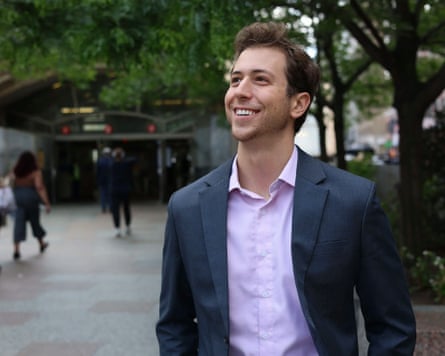
A spokesperson for Nadler emphasized the congressman’s political strength, noting that he won his most recent election with 80% of the vote.
“But this is the great thing about America, it’s a democracy – hopefully still – and anybody can run,” Robert Gottheim, the spokesperson, said, adding that Nadler would “put his over-30-year record of accomplishments against anyone including someone who appears to have no record of accomplishment to speak of”.
Elkind said he voted for Nadler and respected his long record as a progressive voice for New York. But, he argued, the moment demands new energy and a break from the past.
“The house is on fire, and we need leaders who can meet this moment,” he said. “We deserve to know that the next time a child is kidnapped off of our streets, that our congressman will be on that street in the next hour with a megaphone demanding that child’s release and then will travel to whatever foreign gulag the president has decided to stash that kid in.”

 German (DE)
German (DE)  English (US)
English (US)  Spanish (ES)
Spanish (ES)  French (FR)
French (FR)  Hindi (IN)
Hindi (IN)  Italian (IT)
Italian (IT)  Russian (RU)
Russian (RU)  3 weeks ago
3 weeks ago















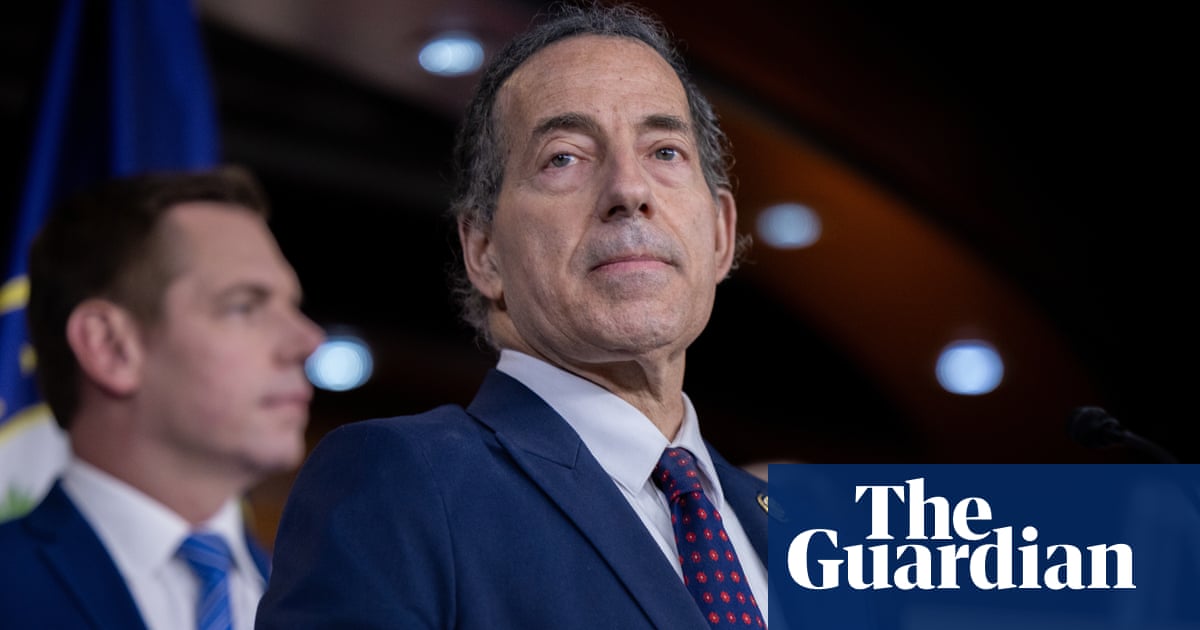








Comments